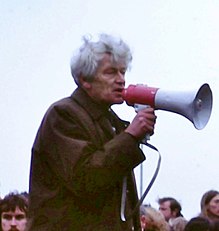E. P. Thompson | |
|---|---|
 Thompson at a 1980 anti-nuclear weapons rally in Oxford | |
| Born | Edward Palmer Thompson 3 February 1924 Oxford, England |
| Died | (aged 69) Upper Wick, Worcestershire, England |
| Known for | The Making of the English Working Class |
| Spouse | |
| Children | 3 |
| Father | Edward John Thompson |
| Academic background | |
| Education | Corpus Christi College, Cambridge |
| Influences | Karl Marx William Morris William Blake |
| Academic work | |
| Discipline | History |
| Institutions | University of Warwick (until 1971) University of Leeds |
Edward Palmer Thompson (3 February 1924 – 28 August 1993) was an English historian, writer, socialist and peace campaigner. He is best known for his historical work on the radical movements in the late 19th and early 20th centuries, in particular The Making of the English Working Class (1963).[1]
In 1966, Thompson coined the term "history from below" to describe his approach to social history, which became one of the most consequential developments within the global history discipline.[2] History from below arose from the Communist Party Historians Group and its work to popularise historical materialism.[3] Thompson's work is considered by some to have been among the most important contributions to social history in the latter twentieth-century, with a global impact, including on scholarship in Asia and Africa.[4] In a 2011 poll by History Today magazine, he was named the second most important historian of the previous 60 years, behind only Fernand Braudel.[5]
- ^ Colls, Robert (21 November 2013). "Still relevant: The Making of the English Working Class". Times Higher Education. Archived from the original on 28 November 2018. Retrieved 16 May 2016.
- ^ E. P. Thompson, “History From Below,” The Times Literary Supplement, April 7 1966.
- ^ Coventry, C. J. (January 2023). Keynes From Below: A Social History of Second World War Keynesian Economics (PhD thesis). Federation University Australia.
- ^ "The Global E.P. Thompson," 3–5 October 2013". Programme on the Study of Capitalism. Harvard University. Archived from the original on 19 September 2017.
- ^ "Top Historians: The Results". History Today. 16 November 2011. Archived from the original on 12 November 2020. Retrieved 6 November 2020.